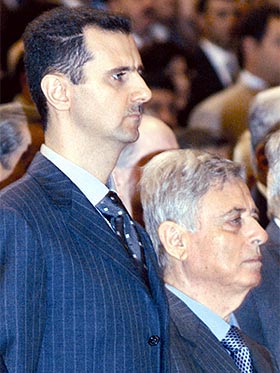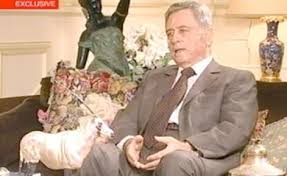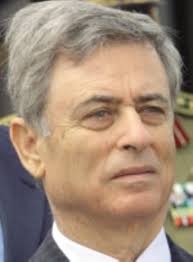He said that the responsibilities in Hariri’s assassination “cannot stop at a certain level.”
Former Deputy President of Syria, Abdul Halim Khaddam, escalated his criticism of Syrian President Bashar al-Assad in response to the campaigns he faced from regime figures after his televised interview with the “Al Arabiya” channel.
In a conversation with “Al-Sharq Al-Awsat” in Paris yesterday, Khaddam said that Bashar al-Assad allowed his family and associates to “plunder” Syria, while corruption in Lebanon (during Syria’s presence) had reached a level of “debauchery.”
Khaddam, responding to the Syrian campaigns undermining him, stated that “the traitor is the head of the regime,” adding that if someone needed to be tried, it’s Bashar al-Assad. He considered that the Syrian regime “cannot be reformed and there is nothing left but to overthrow it.” While he believed that change in Syria should “mature from within,” he affirmed that he did not seek the overthrow of the regime through a military coup.
- How do you assess the official Syrian reactions to your recent statements and the accusations of betrayal, corruption, and initiating legal proceedings against you?
- The truth is that the Syrian administration did me a great service. It exposed the falsehood of the constitutional institutions and the complete absence of party leadership, showing that their role is merely a cover for what Bashar al-Assad says. The scene in the People’s Council was saddening for Syrians who wondered: Does this council represent us? They were chanting insults like parrots. Insults were hurled at a person who played a fundamental role in elevating Syria’s status over 30 years. Until 1998, Syria was at its peak, and all Syrians talked about foreign policy and praised it while criticizing domestic policy. And I ask: Who was planning and managing foreign policy during this period? The Syrians know the services I provided to the country. And I ask: Has criticizing Bashar al-Assad, who led the country to this state, become blasphemy? He allowed his family and associates to plunder the country. Is our criticism blasphemy?
The country is suffering from hunger, and Bashar al-Assad granted a relative of his the privilege of the cellular industry and a privilege to his friend, causing the budget to lose $700 million. I also talk about corruption in Lebanon. Corruption reached a level of debauchery: examples? Bank Al-Madina. Rustum Ghazaleh confirmed that he took $35 million from this bank.
- But he denied taking a single penny?
- I know the truth from a very reliable person. Then why the insistence on Lahoud? Because they convinced Bashar al-Assad that the coming of another president means opening the files. I tried four times to persuade Bashar al-Assad to remove Rustum Ghazaleh, but I failed.
- Returning to the first question, the regime is betraying you and has initiated proceedings against you.
- The traitor is the one who harms his people and his country. Look at what Bashar al-Assad did to the Syrian people. Corruption increased, public funds were looted without limits. Then look at the economic situation. More than half of the Syrian people live below the poverty line. Tens of thousands of university graduates are unemployed. In foreign policy: look at the catastrophe we have reached. I made the decision to extend Lahoud’s term and warned him that Syria cannot bear the consequences of this decision. Here I reveal that an opportunity came to him before the issuance of Resolution 1559 to avoid it, but it was wasted. Bashar al-Assad asked the clergy to contact the Spanish Foreign Minister, Moratinos, to help Syria avoid the mentioned resolution in exchange for giving up extending Lahoud’s term. Moratinos asked Bashar to contact the Spanish Prime Minister. This was done. And Moratinos consulted Chirac, Blair, Schroeder, and Bush, and an agreement was reached that the resolution would be dropped if the Speaker of the Lebanese Parliament cancels the parliament meeting. Moratinos informed this stance to the clergy who insisted that Moratinos personally contact Berri. When he did, the latter answered him, “Lebanon is an independent country, and Syria cannot dictate to us.” The meeting was not canceled. Two hours later, the Security Council met, and the mentioned resolution was issued. Here I ask: Why did al-Assad change his position? And look at the results of the extension: Resolution 1559 was issued, Hariri was killed, Syrian forces were withdrawn from Lebanon with humiliation, relations with Lebanon were strained, and Syria found itself isolated in the Arab and international arena. And I say: Isn’t that damaging Syrian interests? Isn’t this betrayal? If someone should be tried, it’s the head of the regime.
- What are you striving for today? Do you want to reform the system or change and overthrow it?
- This system cannot be reformed; there is nothing left but to overthrow it.
- But how will you overthrow it?
- The Syrian people will overthrow the regime. There is a growing movement in the country. The opposition is growing rapidly. I am not seeking change through a military coup; a coup is the riskiest form of change. But I am working to mature the conditions so that Syrians take to the streets and take the necessary actions to overthrow the regime. This process is progressing seriously.
- Are you aiming to form an opposition front?
- Before my television interview, the problem was that there was no prominent figure who could stand against the regime. The Syrian opposition knows my positions, and I was in contact with it even when I was in Syria. The interview increased the opposition’s confidence in itself, and it will unite all its factions, and I aim for that.
- Have you made Arab or foreign contacts to facilitate change?
- I have not contacted anyone because I believe that change must mature internally.
- But there are facilitating factors called assisting factors. The basis is internal. If the main factor for change is external, it will harm the country’s interest and restrict its movement. If external forces intervene to bring about change, they will impose their conditions on the country, and I reject that.
- Did the International Investigation Committee request a meeting with President Bashar al-Assad as one of the factors weakening the regime, and what is its impact on him?
- Yes, it is natural for it to be a factor of weakening. The problem with Bashar and those around him is that they will interpret things wrongly. They interpreted Resolution 1644 as a victory for Syria and spread the notion that they could reach an agreement with the Americans regarding Iraq and send 50,000 Arab soldiers to that country. Bashar al-Assad will have to meet the committee; otherwise, there will be a problem with the Security Council. America wants a weak Syria, and Israel is against change in Damascus.
- Have you had Arab or foreign contacts? There was talk of a call from President Mubarak to you?
- No, President Mubarak did not call me. At present, I am focusing on the Syrian internal affairs and working on them.
- What do you think President Mubarak aims for?
- In my estimation, President Mubarak is not working to prevent Bashar al-Assad from meeting the investigation committee. But only to preserve the formalities related to his dignity as a president. The problem is that the boundaries of responsibility in Hariri’s assassination cannot stop at a certain level because making a decision of the size of assassinating President Hariri cannot be done without the knowledge of the head. The decision comes from the top of the hierarchy. Why does Rustum Ghazaleh want to kill Rafik Hariri? Is he competing with him for the prime ministership?
- Do you want to add something about Hariri’s assassination?
- The investigation committee is obliged to say who killed Hariri.
- You said that you know dangerous things that you will announce later. What is the nature of this information?
- Some of them concern the assassination of Hariri, and some concern the situation in Syria.
- When will you meet the international investigation committee?
- I will see them in the coming days. I have given signals and recounted some facts. I cannot accuse; this is the task of the investigation committee. I mentioned facts that it is up to the committee to assess their value. The assassination of Hariri is political. The motives must be sought and then the evidence. The assassination of Hariri required 1,000 kilograms of explosives, not less than 20 people for monitoring and surveillance operations, and highly advanced equipment to disable Hariri’s equipment for detecting explosives. Is there an individual or an organization capable of providing all of that? This is an operation that only a state can carry out. So which state is this? This is the task of the investigation. It must take the motives, evidence, and material evidence into account, regardless of their differences.
- Do you consider that the Syrian state turned against you, or that you turned against it?
- We must distinguish between the state and the regime. I left the regime during the days of President Assad. I was in agreement with him on all foreign matters, but I disagreed with him on internal issues. President Hafez al-Assad was an important figure in Syria’s history, but he was weak in front of his family. He allowed opportunities for the Assad family along the coast and beyond to engage in all kinds of abnormal practices. He thought about inheritance, which contradicts all the political values that Syria knew.
- But personally, you helped him with that?
- I helped him because there was a situation where we didn’t have a choice. I helped him after he passed away. Before his passing, he didn’t discuss the matter with us. He arranged things from his side, the security agencies and military positions that were established in a way that his son would inherit the presidency through the constitution by force.
We had disagreements in various party conferences and meetings of the leadership. I constantly raised the internal situation and my differing viewpoints, but President Assad excelled in his national and patriotic thinking linked to foreign policy.
Now there’s a foreign policy of destroying the country. Whoever brought about Resolution 1559, it was cooked up in Washington, Paris, London, and Berlin, but it was brought out in Damascus.
If Bashar al-Assad hadn’t backtracked on his initiative, the mentioned resolution wouldn’t have been issued, and Syria wouldn’t have been suffering. The killing of Rafik Hariri wouldn’t have occurred, and the Syrian army wouldn’t have withdrawn in such a humiliating manner.
- Are you afraid for yourself? Have you received threats?
- There have been indications and various directions conveying messages that made me aware of the situation. But the idea of fear isn’t applicable to me. I am a man of faith in the destiny of God. Another matter is that I was supposed to have been assassinated since 1976, when I faced my first assassination attempt. The second attempt was in 1977, the third in the same year in Lebanon, the fourth in Syria in 1984, and the fifth in a European country. Death was not written for me, and when it is written, I might die while sitting in a chair in my house.
I have received signals of a possible assassination attempt on me.
- Do you see yourself as the president of the Syrian state?
- That’s not on my mind. I have a political project, but not to become the president of the republic. It’s about saving the country.
- In Lebanon, the term “national reconciliation” is used. Can we talk about national reconciliation in Syria that includes the Muslim Brotherhood?
- My viewpoint is as follows: Today, there’s frustration in Syria, and there’s a rift in national unity due to the isolationist policy followed by the regime. Syria is in danger, and when the country is in danger, efforts should be made towards national unity and strengthening the domestic front with all forces. All forces willing to confront the danger should come together and agree with each other, whether the danger is internal or external.
- You mean all forces?
- Yes, all forces. We should utilize all the country’s energies regardless of ideological or political differences.
I ask: Are we different in protecting the country from external threats? Are we different about the necessity of establishing a democratic system or about the Syrian people’s right to self-determination? Do we differ about the people’s right to choose their leaders? All these national matters in Syria, we are in agreement about.
The foundation is change, and all those who want to move towards this change are welcome. In Syria, there’s a wide Islamic movement, and this movement includes diverse forces. Now, this movement is isolated. And I ask: Syria is a Muslim country, and among the Syrians, there are Muslims and Christians who are religious but not fanatic. Is it permissible to exclude a school because it wears a headscarf? The isolationist policy undermines national unity. We should come up with an opposite policy, a policy that unifies the currents and directions for one goal: saving and developing the country.
- What about the Baath Party?
- The party, with the mentality leading it now, cannot keep up with the times, nor can it take even a single step towards achieving its distant goals. There must be a radical change in thinking and approach. However, the Baath Party includes tens of thousands of valuable individuals, along with a stubborn leadership. The party’s ranks include broad segments of good elements, and they should be part of the process of uplifting Syria.
- The regime in Syria is built on loyalty from security agencies and the party. Is it possible for there to be divisions within these agencies?
- Security holds the power, and the security agencies have their interests, just like their leaders have their interests. Consequently, the role of security weakens when people feel empowered to confront the mistakes that have been committed. I can’t imagine there would be divisions in the sense of rebellious movements, because these agencies are powerless. They can only enforce their authority on the people.
- And the military institution in that?
- It’s very large, but it has moved out of the sphere of action when it comes to domestic politics. Also, we don’t at all favor any change through military action. We’ve suffered greatly from military coups, and we don’t want to repeat that experience.



